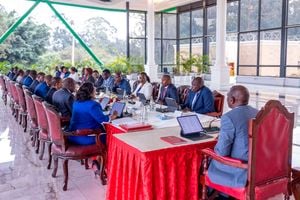Running on empty: Senate halts projects as cash crunch bites

The Senate during a past session.
Controversial Sh450 million pending bills, millions allocated to foreign and domestic travels and contentious budget cuts for committee services are at the centre of a major crisis looming at the Senate.
Legislative and oversight work in the Senate is in limbo due to the severe cash crunch.
Already, this year's Senate Mashinani meeting, scheduled for next month in Busia County, has been cancelled due to the cash crisis.
On Tuesday, the Agriculture Committee also announced the suspension of its activities until it is properly facilitated.
The developments come as the Senate on Wednesday convened an emergency meeting of the Liaison Committee to discuss the cash situation in a bid to avert total paralysis.
Dropping the first bombshell, Agriculture Committee Chairman James Murango (Kirinyaga senator) said his committee would not hold any more meetings until it is properly facilitated.
He told the House that his committee had planned to conduct public participation exercises in Kilifi, Kwale, Lamu, Bungoma, Busia, Nyeri and Kirinyaga.
The committee started public participation in Kwale County, but due to budgetary constraints, the committee is yet to complete public participation in the remaining counties.
During the public participation on the Mung Bill in Kitui, senators were forced to dig into their pockets to facilitate farmers who attended the exercise.
“The committee believes in meeting the farmers in the counties because agriculture is a devolved function and the Bills before the committee concern the lives of the ordinary Kenyans,” said Mr Murango.
“However, these budget constraints have caused significant challenges in processing the business of the committee. The committee this morning resolved to suspend its business until it is properly facilitated to execute its mandate.”
Bungoma Senator David Wakoli, also a member of the committee, called for Senate committees to be given enough money to carry out their activities.
He said that in the last financial year, the committees received between Sh15 million and Sh20 million each, but now they are starved of funds and receive a paltry Sh6 million to Sh9 million.
“We cannot just be in Nairobi and not go to the grassroots for public participation. We were in Mombasa and had to end the meeting prematurely because we were informed that there was not enough money,” said Mr Wakoli.
“It is interesting that we cannot run our operations because of lack of funds and yet we recently approved billions to go to counties.”
Nandi Senator Samson Cherargei added: “It is disappointing that the issue of capacity and ability of committees is dysfunctional. I expect intervention on the matter.”
But Nominated Senator Gloria Orwoba said the committees are not suffering because of budget cuts but as a result of misplaced allocations to certain offices.
“We don’t have a problem of money per se but how the funds are allocated. And that is why they don’t want us to discuss the matter in the House,” she said.
According to Senate budget estimates seen by the Nation, the Office of the Speaker of the Senate has been allocated a budget of Sh82.4 million for the financial year ending June 30, 2025, of which, Sh60 million has been earmarked for local and foreign travel and per diems and air tickets.
On the other hand, the committee services has been allocated Sh170.4 million to cater for the 21 committees in Parliament.
The Senate has three categories of committees including housekeeping, standing and sessional committees.
The housekeeping committees include the Senate Business Committee, the Liaison Committee, Procedure and Rules Committee, and the Powers and Privileges Committee. These committees do not meet as often as the standing and sessional committees.
There are 14 standing committees and three sessional committees, including the County Public Accounts, the County Public Investments and Special Funds, and the Committee on Delegated Legislation.
Another activity that has suffered as a result of the ongoing crisis is the planned Senate Mashinani sessions in Busia County.
The senators had resolved in July to hold their plenary and committee sittings in Busia County between September 23 and 27, 2024.
However, the sittings were postponed to between October 28 and November 1, 2024 due to budgetary constraints.
On Wednesday, a motion was tabled in the House to postpone the holding of Senate Mashinani sittings to the fourth session of 2025 on the recommendation of the Senate Business Committee.
“It is estimated that the activity will cost approximately Sh200 million. With the budget as it is, it will be extremely difficult to fund Senate Mashinani in this financial year without affecting other important programmes, which are already severely constrained, particularly in respect to committees,” reads the document.
In the documents, the Senate was allocated Sh7.4 billion for the current financial year, but Sh450 million in outstanding bills was deducted at source as a first charge on expenditure.
The outstanding bills are largely made up of foreign travel at Sh195 million, domestic travel at Sh158.3 million and hospitality at Sh38 million.
From the slashed budget, a further Sh5.5 billion has been earmarked as fixed operational costs for staff salaries at Sh4.1 billion, county office operations at Sh800 million and mileage at Sh600 million.
This has left a balance of Sh1.44 billion for the rest of the Senate's programmes and operations during the financial year, a decrease of Sh330 million from the previous financial year.
In the previous financial year, the Senate had Sh1.779 billion for its other programmes and operations after taking into account fixed operational costs.
A planned Sh200 million overhaul of the Senate Chamber system was also halted in the circumstances.
The Senate oversight function had been allocated Sh750 million but had to be cut back to Sh500 million as it was in the year ending June 30, 2024.
In the year ended June 30, 2025, the Parliamentary Service Commission sought Sh14.41 billion to finance programmes and operations of the Senate but they were allocated Sh8 billion, falling short by Sh6.4 billion. In the previous financial year, the Senate received Sh7.4 billion
Following the referral of the Finance Bill, 2024 by the President back to Parliament for re-consideration, the Supplementary Appropriation Bill, 2024 was introduced, proposing an overall reduction of Sh3.732 billion from the Parliament vote from Sh44.59 billion to Sh40.86 billion.
This reduced Senate’s vote by Sh544.29 million from Sh8 billion to Sh7.465 billion, which was further slashed by Sh605.82 million to Sh7.4 billion
Senate legislation and oversight suffered a cut of Sh123.8 million; Senate representation, liaison and intergovernmental relations by Sh332 million while general administration, planning and support services suffered a reduction of Sh150 million.
The Senate legislation and oversight programme covers critical programmes, including inter-parliamentary diplomacy, committee operations, mileage and domestic subsistence allowance.
The Senate representation, liaison and intergovernmental relations is the programme that includes operations relating to county offices, the Senate oversight function and outreach, wellness and ports.
The general administration, planning and support services programme includes critical areas such as emoluments, maintenance and estate management.





